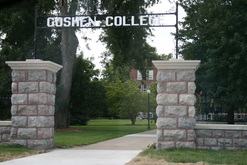
Two stories will illustrate my concerns. When I took a race and ethnic relations class, I heard only one very narrow perspective and understanding of racism. In another context, I was introduced to the book by Shelby Steele called The Content of Our Character. I met the professor outside of class.
Me: "I wondered what you thought of this book."
Prof: "I have that book, it's not credible."
Me: "So you've read it?"
Prof: "No, but I've read some reviews."
Me: "And the reviews weren't positive?"
Prof: "No."
That was the end of the matter. There was no engaging with the ideas or wrestling with perspectives. To my surprise, he came to class a few weeks later with the book and a chapter he had copied for everyone to read. The chapter he chose was an autobiographical disclosure by Steele revealing he is a middle-class black. He began the class discussion by asking the class to decide (before hearing his ideas) if he was a credible voice about racism based on his middle class status. Once the professor had the class thoroughly enraged at the temerity of a middle class black writing about racism, he then led them in taking apart Steele's perspective. My concern is not that I think Steele's perspective was correct. My concern is the inherent racism of a white, middle class professor as he dismissed out of hand the perspectives of a conservative black man because of his economic location.
The second story is from the human sexuality class I took. Already in the early '90's, the class had a clear push to move students toward embracing and affirming gay marriage. The class was large enough that we met in small groups with teaching assistants. As we were nearing the end of the trimester, I asked my teaching assistant to point me to some of the better resources in psychology and social sciences that would help understand sexual identity from the perspective of what the church teaches. He told me he would check with the professor and get back with me. A week later, he came and flatly said, "There aren't any." A year later, i was a student at Associated Mennonite Biblical Seminary and I asked a professor there the same question. He referred me to a number of helpful and excellent resources.
I also know that there are many professors at Goshen College that do give a high quality education, who provide the best of what is known about a variety of subjects. My objection to Goshen College is that, in some areas, its educational quality is at a very low level and it fails to address that problem. Professors teach to indoctrinate students to their beliefs, some of which are opposed to what the church says it believes in the Confession of Faith. They're more sophisticated in their methods than fundamentalist religious schools, but they do not introduce students to the best of other viewpoints in a dispassionate way. They become demagogues, and classes become about activism and intimidation.
I continue to hear stories like mine from past and current students. In the end, it's a shell game. A professor withholds information, doesn't present other perspectives in a competent manner, and fails to give the tools to students to articulate alternative points of view. Then when the student writes a paper that comes from a different perspective, they can lower the grade because it is not credibly sourced.
But the heart of the problem is an integrity issue. For years, it seemed the college would try to have it both ways by pretending to be one thing through its admission and church relations office while in reality having a very different campus environment. That seems to no longer be working as the facade is crumbling. I would challenge the college to work differently, to either publicly acknowledge the demagoguery in its midst or to ensure that it's classroom and campus environment is one that equips students to understand the best arguments both for what the church believes and for other points of view. It is a church institution. The church's perspective should be given due process in the classroom.
UPDATE 9/19/14 - This article has gotten a lot of readers and responses and I did a follow up post today highlighting some of the ambivalence I felt about writing this article. All comments are moderated and I will not post any that are personal attacks or use coarse language. If you do comment, I encourage you to simply describe your experience, and minimize language that describes motives or paints a broad brush. There are many fine people at Goshen College, and I think we are best served by simply unveiling the truth of our experiences. The pattern through the years is that the college will simply ignore criticism that is layered with too much vitriol. Thanks. JT
-John M Troyer
 RSS Feed
RSS Feed
